- Home
- Keith R. A. DeCandido
Star Trek - TNG - 61 - Diplomatic Implausibility Page 5
Star Trek - TNG - 61 - Diplomatic Implausibility Read online
Page 5
"Thank you, Captain Picard. There is no change to the mission, and the ambassador's aide can beam over at any time. However, Chancellor Martok wishes to brief the ambassador and me. Please transport him to the Sword of Kahless. I will meet him there in ten minutes."
"Of course."
Business concluded, Klag turned to look at Picard's first officer. "It is good to see you again, Riker."
Riker grinned with a face that was now inexplicably beardless. "Same here, Klag. It'd be good to have a chance to catch up. If nothing else, I'd love to hear about what happened to your arm."
"That, my old friend, is a long story. Luckily, I have a case of blood wine that will go quite well with long stories. With your captain's permission, I will contact you when my business with the chancellor is concluded, and we can speak of old times."
Picard nodded. "My permission is granted, Captain. In addition, my chief medical officer tells me she has an old comrade serving on your vessel"
This news did not surprise Klag. B'Oraq, the Gorkon's doctor, had studied medicine in the Federation. "She, too, may beam aboard at her leisure, Captain."
"Thank you, Captain. Enterprise out."
Klag rose from the captain's chair. "Commander Drex, you are in command until I return from the Sword ofkah less."
"Yes, sir," Drex muttered.
"Is there a problem, Commander?" Drex straightened. "None, sir," he said with more authority.
"Good. See that that state of affairs continues."
With that Klag left the bridge, followed by his own personal guard. The pair of them proceeded to the transporter room in silence.
Klag arrived in the Sword of Kahless's much larger transporter room to see a Klingon as tall as Klag himself, wearing a brown tunic with silver trim under a gray vest decorated on either lapel with the Federation and Klingon Empire insignias.
"I am Klag, captain of the Gorkon," he said as he stepped down from the platform. "On behalf of the Defense Force and the High Council, I welcome you, Ambassador Worf."
Worf nodded. "Thank you, Captain. It will be an honor to be transported by one of the finest new vessels in the fleet"
A bekk--the Defense Force equivalent of a noncommissioned security guard--stood in the doorway and said, "The chancellor awaits you both," then led the way out of the transporter room.
The bekk took them through several corridors, bringing them further into the interior of the massive vessel. A guard was stationed at the door, and Klag's guard joined him as the captain and Worf entered.
Only two others had served as head of the High Council in Klag's lifetime, and Klag had met them both. K'mpec had once traveled on the Baruk, on which Klag served as an ensign. He had seemed larger than life to Klag, a near-mythic figure who, at that time, had already served as chancellor longer than anyone in history. K'mpec carried himself as if he had been born to lead the empire, and the old warrior's death had saddened Klag. Many years later, Klag had met Gowron, who had struck him as little more than a political opportunist who had schemed his way to the top. He had seemed born only to best serve himself rather than the empire.
Although Klag had, of course, served under Mar tok--every member of the Defense Force did during his tenure as Gowron's chief of staff--he'd never met him until now. The man who got up from a chair far more ornate than any on which Klag had ever sat seemed to rank between the two extremes of his predecessors. He had none of K'mpec's grandeur, nor Gowron's self importance--simply the face of a warrior, proudly bearing the scars of die Jem'Hadar blade that had cost him his left eye. The smile with which he greeted them was genuine.
"Worf!" Martok said as he rose. "It is good to see you again, my friend, as always." He turned his one eye to Klag. "And the Hero of Marcan. It is an honor to have you aboard my flagship, Captain."
To Klag's surprise and delight, Martok actually sounded like he meant it
"The honor is mine, Chancellor. I simply won a battle. It was you who won the war." "We all won the war," the chancellor said, "the empire, the Federation, and even the Romulans. We claimed victory through unity. And unity is what we must now discuss."
Martok indicated two other chairs--far smaller, of course--as he sat back down in his own.
Turning to Klag, Martok said, "First of all, Captain, I wish to make something clear. Worf will be in charge of the mission to tad. From this point until the mission concludes, command is his."
Klag leaned forward. This was not what he had in mind.
"Chancellor--"
"You still command the Gorkon, and obviously Worf has no authority in any matters outside the purview of the mission--but the mission is his.
Is that understood?"
Oh, I understand just fine, Klag thought bitterly. You use your influence unfairly, son of Mogh--as you did to obtain this position.
Another voice rang out in the back of Klag's head: And what was it you used to ensure that the Gorkon escort the ambassador to tad in the first place?
Aloud, Klag said only, "Of course."
"Good." Martok turned back to Worf. "The situation on tad is difficult. All things being equal, I might consider allowing the al'Hmatti their independence."
Klag blinked in surprise.
"But all things are not equal," Martok continued. "Several conquered worlds have taken advantage of the war to foment their own rebellions.
None are as far along as tad's, nor may they be. If we grant tad freedom from our rule, it will be a sign of weakness, and encourage other worlds to wrestle for independence."
Interesting, Klag thought He had not known this bit of intelligence; he could hardly blame the High Council for keeping it quiet. He wondered what other worlds had attempted to throw off their overseers.
Martok leaned forward and looked at Worf. "Let me do you the honor of being blunt, Worf. Under no circumstances can I allow tad to be ruled by anyone other than Klingons. To do that would plunge the empire into a dozen conflicts at a time when we are attempting to rebuild a fleet. I will not be remembered as the chancellor who led the empire to victory over the Dominion only to lose a quarter of our territory tojeghpu ''."
Worf nodded. "Thank you, Chancellor. It is my hope that a solution can be reached that will please all sides."
"The only side that concerns me is that which will keep the empire intact."
"Naturally. But I do not work for the empire. My first duty is to the Federation; my second to the alliance between the two governments. You may rest assured that I intend to serve both."
And no mention of his duty to the House of Martok, Klag noted. wonder if that is due to my presence.
Martok laughed. "You already sound like a diplomat, Worf. I'm sure that if anyone can find that solution, it will be you." He leaned back. "Excellent. I'm glad that's over with. Someday, my friend, I will find it in my heart to forgive you for turning me into a politician."
Said Worf, "I have had no reason to regret my actions, Chancellor."
"No, I suppose you haven't," Martok said with a snort. "Well, enough of this. Captain, again, it is an honor to have met you finally. And we will meet again at Ty'Gokor in a few months' time."
Klag fought to control his reaction. So, I will be inducted into the Order of the Bat'leth after all. He couldn't help but direct a few smug thoughts in the direction of Kargan, in whichever afterlife was unfortunate enough to have him. "The chancellor honors me," Klag said, rising from his chair. "With your permission, we will return to the Gorkon."
"Not just yet. Oh, you're dismissed, Captain, and may return to your ship. But Worf and I have other matters to discuss. Family matters."
All the joy he felt at Martok's pronouncement fled Klag. was right.
This entire show was for my benefit. The true business will commence after I leave.
Not wishing to show his anger in front of Martok-who was, after all, still supreme commander of the empire's citizenry--Klag simply said, "As the chancellor commands."
With that, he left, his guard f
ollowing close behind.
Klag decided that his first impression of Martok needed to be revised somewhat.
The first time William Riker ever set foot on a Klingon ship, he was ten years old. After years of pestering his father to take him along on one of the assignments that took Kyle Riker away from home for long periods of time, Dad finally acquiesced--on a mission that entailed passage with the Klingons.
From the moment Will first beamed into the dark, funny-smelling ship full of large, foreboding creatures who seemed to spend all their time growling down at him, he was scared to death. He retreated to the tiny cabin assigned to him and Dad, sat on the metal slab that was supposed to be a bed, and hoped nobody would see him crying.
He never asked to go along with his father again. When he was older, and more cynical, Will figured that Dad chose the Klingon ship hoping for precisely that result.
Ten years later, as a cadet at Starfleet Academy, he went on a mission that required him to board a Klingon ship. It had taken all the fortitude his twenty-year-old self could muster not to cower in fear at the very idea.
Now, of course, he was over forty and beyond such things. He had spent plenty of time on Klingon ships and in Klingon space, ranging from a historic-if-brief tour as the first officer of the I. K S. Pagh (the first time a Starfleet officer formally served as a member of a Klingon Defense Force crew) to more recent visits during the Dominion War.
But as he materialized alongside Beverly Crusher and Giancarlo Wu in the Gorkon transporter room, he couldn't help but hear his ten-year-old self saying, "Dad, it's dark in here!"
Waiting for them was Klag, once Riker's second officer on the Pagh, now the captain of this ship. The two had formed a close friendship during Riker's tenure on the Pagh, and they had stayed in sporadic touch ever since. After Riker's departure, Klag had been made first officer, and had remained at that post for the decade following-an unusually long time for a Klingon to remain at one post.
Klag had changed over the years. For one thing, as Riker had noted before, he had lost his right arm. His straight, jet-black hair was now twice as long as the shoulder-length cut Riker remembered, and his goatee had grown in fuller. He still had the same eyebrows-up swept even by Klingon standards--sharp nose, and penetrating black eyes.
Next to Klag stood a taller, lankier Klingon with a scowl on his face; this man had the insignia of a commander, so Riker figured he was the first officer.
"Welcome to the Gorkon, Commander Riker," Klag said. He still had the same deep, resonant voice that Riker remembered.
"Thank you. This is Dr. Beverly Crusher, and the ambassador's aide, Giancarlo Wu."
The commander made a noise, and then muttered something under his breath. Riker didn't catch all of it, but it sounded like something derogatory about humans.
In flawless Klingon, Wu said, "I have slept on plenty of metal slabs in my time, Commander. You needn't worry about my well-being."
Klag threw his head back and laughed the hearty laugh that had startled Riker out of ten years' growth when he first heard it in the Pagh's mess hall. "Well said, Wu." Klag then turned to Beverly and said, "B'Oraq has been looking forward to seeing you again, Doctor."
"Likewise," Beverly said with a nod.
Klag said, "Commander Drex will escort you to the medical ward, and the ambassador's aide to his quarters."
Without preamble, Drex moved to the exit without bothering to see if Wu and Beverly followed. In a human, that would have been considered rude, but it was normal for Klingons. If you don't have the brains to follow, you don't deserve to be escorted in the first place, Riker thought with a smile. He had to admit to admiring the blunt simplicity.
Once the door closed behind Beverly, Klag turned to Riker and slapped him on the arm. "It has been a long time, my friend. Come, let us drink and remember old times." "Lead on," Riker said, glad he had had the foresight to take an anti-inebriant before leaving the Enterprise. Bloodwine went right to his head.
For the first time in Beverly Crusher's medical career, she walked into a Klingon medical ward without wincing.
Well, not wincing too much, in any case ... The pitiful state of Klingon medicine had been a constant source of annoyance to Beverly, especially once she signed onto a ship with a Klingon officer whom she would be responsible for treating. Starfleet's smallest emergency medikit was better equipped than the best Klingon hospital.
But the Gorkon's medical ward seemed almost adequate. And Beverly suspected she knew the reason why.
"Hello, B'Oraq," she said to the woman presently sitting at a small desk, reading a computer screen.
The woman--short and compact by Klingon standards, which made her close to the average height for a human woman, and with dark green eyes--looked up, and bared her teeth. She cried, "ghojmohwi'," the Klingon word for teacher or mentor. "I had hoped to see you when I learned we were meeting with your ship."
And then, in an un-Klingon-like gesture, B'Oraq got up and gave Beverly a hug.
"It's good to see you, too, B'Oraq," Beverly said, returning the hug.
"I see you've made some progress."
"Actually, you can thank the war," B'Oraq said, pulling on her braid as she spoke, a nervous habit she hadn't lost in the past decade. Her auburn hair, which had been waist-length ten years earlier, barely reached her neck now. However, she retained the braid that extended down past her right shoulder, secured at the end with a small pin in the shape of the emblem of her House. "Not only was it a glorious victory for the empire--and the rest of the quadrant," she added quickly, "but it, more than anything, enabled me to finally make some of the advances I had been trying to put forward in Defense Force medicine."
Beverly, who had a hard time using the word glorious to apply to the drawn-out misery of the Dominion War, frowned and asked, "In what way?"
"Well, it's all well and good to insist that you can survive with an injury and that to have it treated is a sign of weakness. But when the Federation and Romulan soldiers fighting alongside you are fully recovered from more devastating injuries in less than a day, you start to learn the value of being able to knit bones in an instant and return whole warriors to the field of battle."
Beverly chuckled at that. The Klingon Empire had a lengthy history of warfare, but the Dominion War was the first time they'd fought for such a protracted period alongside such powerful allies. suppose it's bound to have an effect, she thought.
Showing off her medical ward with a gesture, B'Oraq continued: "So they finally allowed me to design a new medical facility. Mind you, what you see here is not what I originally designed. For one thing, more or less every cosmetic application was rejected--we are too proud of our scars, it would seem." Smiling, Beverly said, "This is an empire with a one eyed chancellor."
B'Oraq laughed. "True, true. However, this is only the beginning. The door is open, but I am determined that by the time I die, Defense Force vessels will have sickbays to match those of Starfleet."
"If anyone can do it, you can."
Beverly had first met B'Oraq ten years ago, while serving as the head of Starfleet Medical. Sitting in her office, going over starship personnel requisitions, Beverly had been interrupted by an auburn-haired Klingon, demanding to know why she was being discriminated against.
Knowing that the empire had appallingly bad medical standards, B'Oraq--the daughter of a physician--decided not only to follow in her father's footsteps, but to bring better medicine to her people. To that end, she applied to the Starfleet Medical Academy. When she barged into Beverly's office, she was in her final year, and working at Spacedock's medical facility. Where her classmates worked with patients, sat in on surgical procedures, and gained valuable experience, B'Oraq had been given all scut work and the simplest patients to handle.
Beverly investigated, and it turned out that B'Oraq's supervisor had, not unreasonably, assumed that B'Oraq-who had made clear her intention to return to the Empire after graduation--would not be practicing medicine at any
thing near Starfleet's standard. B'Oraq pointed out that she intended to raise that standard, but she couldn't if she never got the diversified experience her classmates were getting.
With Beverly's help, she got that experience, and the two of them remained in touch for the rest of Beverly's tenure at Starfleet Medical.
"I even managed to get some prosthetics on board," B'Oraq was saying, opening a storage locker that was full of an assortment of limbs and other body parts, "though they're not officially part of our manifest.
But I got them from the same Ferengi dealer who supplies Captain Klag with his blood wine so I doubt there will be any problems." "Well, B'Oraq, I have to say, I'm im. I was skeptical ten years ago, but it looks like you've done wonders here." "As I said, I have only started." She sat back down at her desk, indicating the guest chair for Beverly. "So how have you been?" "Busy," Beverly said as she took the chair. "War is always boom-time for doctors. I've done more surgery in the last two years than I did in the ten years previous. But we did well. Ninety-nine percent of the people who actually made it to sickbay lived to tell about it."
"Excellent."
"I suppose," Beverly said with a sigh. The problem, she thought, were all those who never made it to sickbay.
"As I recall, you had a son who served on the Enterprise with you, yes?
Is he well?" "Well enough," Beverly said with a lopsided smile. "He's, ah, not with Starfleet anymore. He's--traveling." How do I explain to B'Oraq that my son is living on another plane of existence when I don't entirely understand it myself?
She was saved from having to explain further by the door to the medical ward opening on a face Beverly had never expected to see again.
"Kurak?"
Kurak--now wearing the uniform of a commander-looked at Beverly and snarled. Then again, Kurak always seemed to be snarling. Her large brown eyes always smoldered with anger, and her lips were always pursed, when they weren't curled in a snarl. "You! What are you doing here?"

 Alien
Alien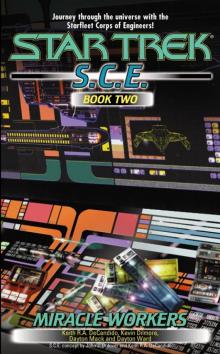 Miracle Workers
Miracle Workers Articles of the Federation
Articles of the Federation Supernatural Heart of the Dragon
Supernatural Heart of the Dragon War Stories: Book Two
War Stories: Book Two The Zoo Job
The Zoo Job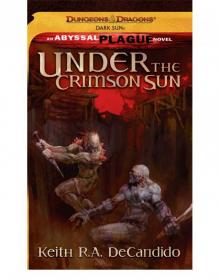 Under the Crimson Sun
Under the Crimson Sun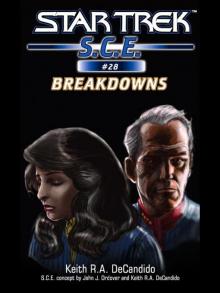 Breakdowns
Breakdowns Mermaid Precinct (ARC)
Mermaid Precinct (ARC)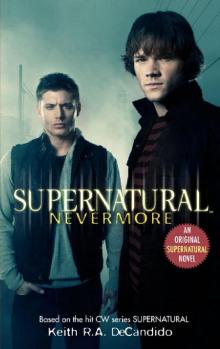 Supernatural 1 - Nevermore
Supernatural 1 - Nevermore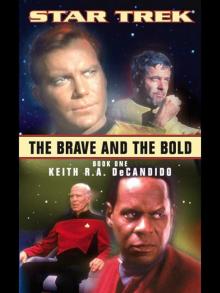 STAR TREK - The Brave and the Bold Book One
STAR TREK - The Brave and the Bold Book One Four Walls
Four Walls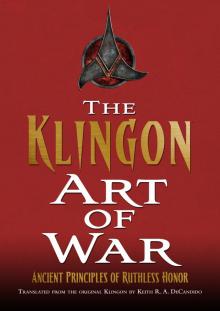 The Klingon Art of War
The Klingon Art of War Blackout
Blackout War Stories: Book One
War Stories: Book One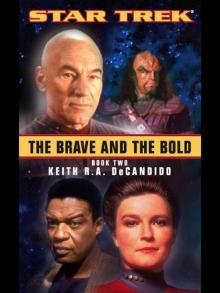 The Brave and the Bold Book Two
The Brave and the Bold Book Two Honor Bound
Honor Bound Sleepy Hollow: Children of the Revolution
Sleepy Hollow: Children of the Revolution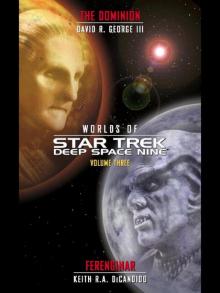 Worlds of Star Trek Deep Space Nine® Volume Three
Worlds of Star Trek Deep Space Nine® Volume Three Star Trek: TNG: Enterprises of Great Pitch and Moment
Star Trek: TNG: Enterprises of Great Pitch and Moment Genesis
Genesis Demons of Air and Darkness
Demons of Air and Darkness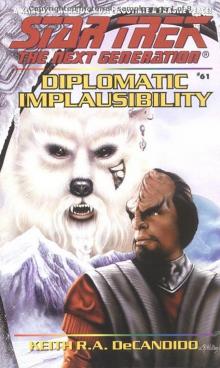 Star Trek - TNG - 61 - Diplomatic Implausibility
Star Trek - TNG - 61 - Diplomatic Implausibility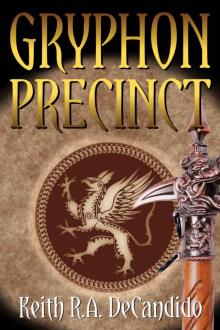 Gryphon Precinct (Dragon Precinct)
Gryphon Precinct (Dragon Precinct)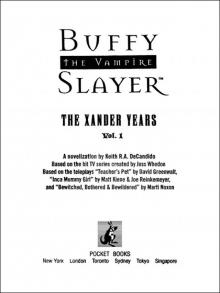 THE XANDER YEARS, Vol. 1
THE XANDER YEARS, Vol. 1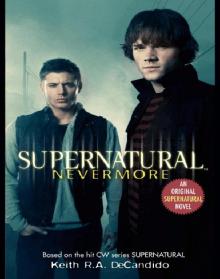 Nevermore
Nevermore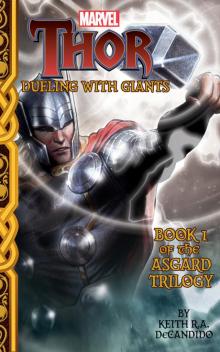 Thor
Thor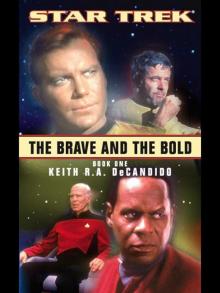 The Brave And The Bold Book One
The Brave And The Bold Book One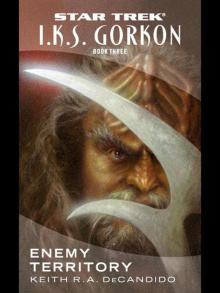 I.K.S. Gorkon Book Three
I.K.S. Gorkon Book Three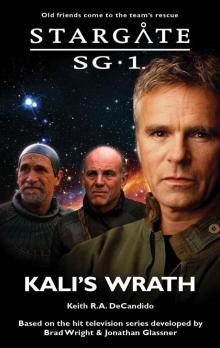 STARGATE SG-1: Kali's Wrath (SG1-28)
STARGATE SG-1: Kali's Wrath (SG1-28) Bone Key
Bone Key Guilt in Innocece
Guilt in Innocece Star Trek - DS9 Relaunch 04 - Gateways - 4 of 7 - Demons Of Air And Darkness
Star Trek - DS9 Relaunch 04 - Gateways - 4 of 7 - Demons Of Air And Darkness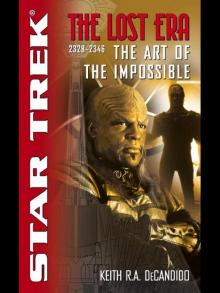 The Art of the Impossible
The Art of the Impossible I.K.S. Gorkon Book One: A Good Day to Die
I.K.S. Gorkon Book One: A Good Day to Die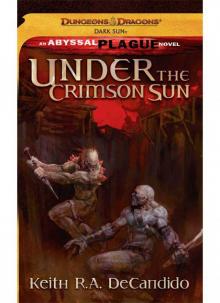 Under the Crimson Sun (the abyssal plague)
Under the Crimson Sun (the abyssal plague)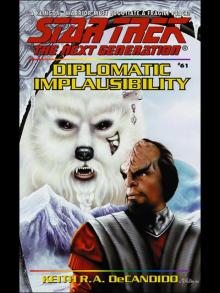 DIPLOMATIC IMPLAUSIBILITY
DIPLOMATIC IMPLAUSIBILITY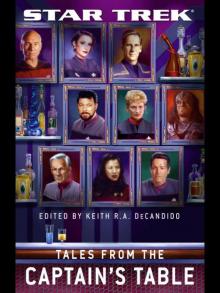 Tales from the Captain's Table
Tales from the Captain's Table A Burning House
A Burning House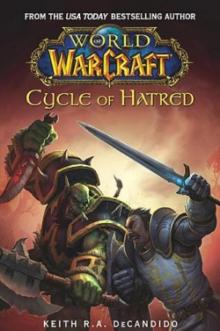 Cycle of Hatred (world of warcraft)
Cycle of Hatred (world of warcraft)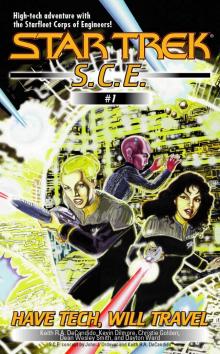 Have Tech, Will Travel
Have Tech, Will Travel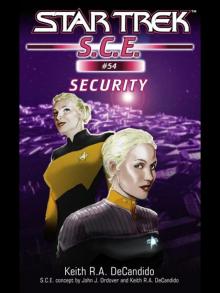 Security
Security